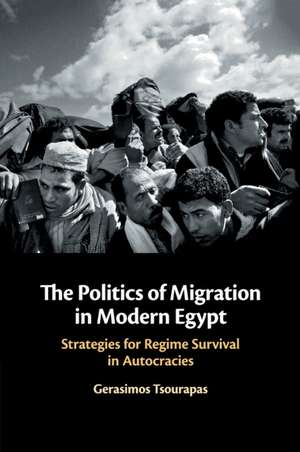The Politics of Migration in Modern Egypt: Strategies for Regime Survival in Autocracies
Autor Gerasimos Tsourapasen Limba Engleză Paperback – 17 iun 2020
| Toate formatele și edițiile | Preț | Express |
|---|---|---|
| Paperback (1) | 283.79 lei 6-8 săpt. | |
| Cambridge University Press – 17 iun 2020 | 283.79 lei 6-8 săpt. | |
| Hardback (1) | 474.75 lei 38-44 zile | |
| Cambridge University Press – 19 dec 2018 | 474.75 lei 38-44 zile |
Preț: 283.79 lei
Nou
Puncte Express: 426
Preț estimativ în valută:
54.31€ • 56.11$ • 45.17£
54.31€ • 56.11$ • 45.17£
Carte tipărită la comandă
Livrare economică 19 martie-02 aprilie
Preluare comenzi: 021 569.72.76
Specificații
ISBN-13: 9781108468640
ISBN-10: 1108468640
Pagini: 264
Ilustrații: 23 b/w illus.
Dimensiuni: 153 x 230 x 20 mm
Greutate: 0.36 kg
Editura: Cambridge University Press
Colecția Cambridge University Press
Locul publicării:Cambridge, United Kingdom
ISBN-10: 1108468640
Pagini: 264
Ilustrații: 23 b/w illus.
Dimensiuni: 153 x 230 x 20 mm
Greutate: 0.36 kg
Editura: Cambridge University Press
Colecția Cambridge University Press
Locul publicării:Cambridge, United Kingdom
Cuprins
1. Introduction; 2. 'Egyptians don't emigrate' – the domestic politics of migration restriction, 1952–1970; 3. Exporting the free officers' revolution – migration and external regime legitimacy under Nasser; 4. 'Our most precious asset' – the domestic politics of migration liberalisation, 1970–2011; 5. The rich hive invaded by foreign bees' – migration and external regime legitimacy under Sadat and Mubarak; 6. Egypt's road to the 'Arab spring'; 7. Conclusion.
Recenzii
'Labour immigration policies have been largely researched but not their counterpart emigration policies. In this book, Gerasimos Tsourapas fills this void, theorising and bringing out the political rationale of these policies over three articulations of Egyptian authoritarianism between the 1950s and 2011. Based on impressive primary and secondary sources, the book will be essential material for researchers in migration studies, Egyptian politics and politics of authoritarianism more generally.' Ibrahim Awad, The American University in Cairo
'This is an important and insightful book that develops an original argument around the politics and the political economy of migration in modern Egypt. Gerasimos Tsourapas unravels with consummate skill the threads that bind the fate of Egyptian governments to the success or otherwise of Egypt's export of human capital over the course of the past sixty years. In a lucid and highly readable account he explores the ways in which this phenomenon has been a key factor in Egypt's regional as well as domestic political predicaments.' Charles Tripp, School of Oriental and African Studies, University of London
'A unique book on how the most sedentary people on earth suddenly discovered exodus, and the world's oldest nation its citizens abroad. Tsourapas offers a major contribution to both the history of contemporary Egypt and the scientific study of international migration.' Philippe Fargues, European University Institute, Florence
'A pioneer study theorizing across a spectrum of non-democratic regimes and perceptively tracing the relationships in Egypt (1952–2011) between different policies (de)regulating the emigration of workers and professionals and regime legitimation, the policy priority being political survival.' Clement M. Henry, University of Texas, Austin
'The Politics of Migration in Modern Egypt makes a major contribution to the nascent literature on migration states beyond the Global North. Melding analytical insights from immigration and emigration, as well as diasporas and development, Tsourapas provides a framework for thinking about migration policy as a multidimensional set of strategic decisions. His study offers an invaluable benchmark, especially for comparisons to other authoritarian regimes.' Audie Klotz, Syracuse University, New York
'This is an important and insightful book that develops an original argument around the politics and the political economy of migration in modern Egypt. Gerasimos Tsourapas unravels with consummate skill the threads that bind the fate of Egyptian governments to the success or otherwise of Egypt's export of human capital over the course of the past sixty years. In a lucid and highly readable account he explores the ways in which this phenomenon has been a key factor in Egypt's regional as well as domestic political predicaments.' Charles Tripp, School of Oriental and African Studies, University of London
'A unique book on how the most sedentary people on earth suddenly discovered exodus, and the world's oldest nation its citizens abroad. Tsourapas offers a major contribution to both the history of contemporary Egypt and the scientific study of international migration.' Philippe Fargues, European University Institute, Florence
'A pioneer study theorizing across a spectrum of non-democratic regimes and perceptively tracing the relationships in Egypt (1952–2011) between different policies (de)regulating the emigration of workers and professionals and regime legitimation, the policy priority being political survival.' Clement M. Henry, University of Texas, Austin
'The Politics of Migration in Modern Egypt makes a major contribution to the nascent literature on migration states beyond the Global North. Melding analytical insights from immigration and emigration, as well as diasporas and development, Tsourapas provides a framework for thinking about migration policy as a multidimensional set of strategic decisions. His study offers an invaluable benchmark, especially for comparisons to other authoritarian regimes.' Audie Klotz, Syracuse University, New York
Notă biografică
Descriere
Examines how authoritarian regimes employ labour emigration in order to remain in power, both in Egypt and beyond.
